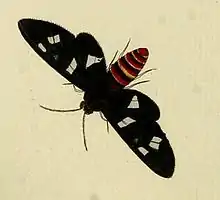Euchromia creusa
Euchromia creusa is a moth of the subfamily Arctiinae. The species was first described by Carl Linnaeus in his 1758 10th edition of Systema Naturae.[1] It is found in Australia (northern Queensland), Ceram, Key Island, New Guinea, the New Hebrides, the Solomon Islands, the Pelew Islands, Fiji and Vanuatu.
| Euchromia creusa | |
|---|---|
 | |
| Scientific classification | |
| Kingdom: | |
| Phylum: | |
| Class: | |
| Order: | |
| Family: | |
| Subfamily: | |
| Genus: | |
| Species: | E. creusa |
| Binomial name | |
| Euchromia creusa | |
| Synonyms | |
| |
The wingspan is about 50 mm. Adults are wasp mimics. They have black wings, with transparent spots and a blue comma-shaped mark near the centre of the forewing. The hindwings are about half the span of the forewings. There are transverse black and red bands on the body.[2]
References
Wikimedia Commons has media related to Euchromia creusa.
Wikispecies has information related to Euchromia creusa.
- Savela, Markku. "Euchromia creusa (Linnaeus, 1758)". Lepidoptera and Some Other Life Forms. Retrieved 28 August 2019.
- Herbison-Evans, Don & Crossley, Stella (9 July 2017). " Euchromia creusa (Linnaeus, 1758)". Australian Caterpillars and their Butterflies and Moths. Retrieved 28 August 2019.
This article is issued from Wikipedia. The text is licensed under Creative Commons - Attribution - Sharealike. Additional terms may apply for the media files.